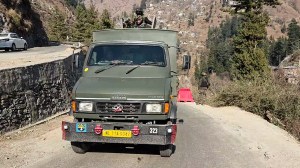Poll vaulter
Makpa, February 3, 2005, 1.30 pm. More than 70 per cent votes have been cast. Poll officials pack their bags8212;EVMs included8212;and lea...

Makpa, February 3, 2005,
1.30 pm. More than 70 per cent votes have been cast. Poll officials pack their bags8212;EVMs included8212;and leave in a hurry.
Makpa, September 18, 2005,
1.30 pm. Only 30 per cent votes have been cast. Poll officials are busy dealing with voters. There is no sign of trouble.
THIS is the story of a polling station in the village of former RJD minister Shakeel Ahmad Khan. At the time of the February polling, the RJD was in power, Bihar Police jawans were deployed to guard the booth, relatives of Khan had their say and the men in uniform looked the other way.
This time round Allauddin Khan, the village8217;s RJD strongman, sat outside his house looking longingly at, what used to be, 8216;8216;his8217;8217; booth. Jawans of the Border Security Force were on guard and no one was allowed to enter the polling station without identification.
Booth-grabbing and elections have been synonymous in Bihar. Perhaps, no longer. With two phases of the polling staggered over a month already over, the Election Commission has achieved the near-impossible in Bihar.
The moves for this may well have been planned at Nirvachan Bhawan in Delhi but if there8217;s anyone who deserves the honour on ground, it is the Election Commission8217;s Bihar advisor K. J. Rao.
PRAISE has come in for Rao from many quarters. Outside the polling booth at Kolhua under the Muzaffarpur constituency, Dalits stood in long queues. 8216;8216;After many years we are getting an opportunity to vote,8217;8217; says Girdhar Paswan, pointing out that in the past only the influential got to cast their votes.
Rao is an old Bihar hand8212;he8217;s been involved with elections in the state for the last 15 years. But it was only during the February assembly polls that he was given a free hand. Rao says he used his experience in Jammu and Kashmir to supervise one of the smoothest elections in Bihar. Some reports of booth-grabbing did come in though indicating that some holes still needed to be plugged.
AT an age where many contemplate retirement, a wiry Rao who has crossed 60, is in the midst of action. An average day for him means much travelling and he seems to be walking, hopping on to a car or a helicopter with equal ease. In fact, he doesn8217;t hesitate to even ride pillion on a motorcycle to reach the state8217;s remote villages.
And of course he has mastered the art of landing unannounced, often to the dismay of local authorities. 8216;8216;I am just doing my job,8217;8217; is how he describes his bumpy ride in turbulent Bihar.
The ride has been bumpy on many occasions. The first roadblock came over deployment of paramilitary forces. In the past the bulk of the central forces would be used for road patrol on polling day while the state police personnel would 8216;8216;guard8217;8217; the booths. Rao, on orders of the Election Commission, reversed the practice. That changed everything.
Also violence was not made the sole criteria in selecting sensitive booths. All those booths which had recorded an abnormally high percentage of voting in the last elections were put under this category and were guarded by the central forces.
Learning from past mistakes, this time a bit of secrecy was employed. None of the central forces and polling personnel were told where they were to be deployed till the morning of the poll.
This ensured they got no chance to strike up friendships with anyone or be bribed. Also in the Naxal areas it was an effective shield against landmine blasts.
BUT the overdrive has come at a cost. A man was gunned down by a BSF jawan, mistaken for a booth grabber in Raghopur constituency. At many other places the central forces were seen bullying and herding voters. Rao himself caught some drunk jawans in Munger and suspended them.
In addition Rao came in for much criticism for saying that holding elections in Bihar was more difficult than in Jammu and Kashmir. The RJD which has already accused the EC of being biased, seized it as another opportunity to criticise Rao.
But all that has not stopped Rao from doing what he says is 8216;8216;just his job8217;8217;.
- 01
- 02
- 03
- 04
- 05






























